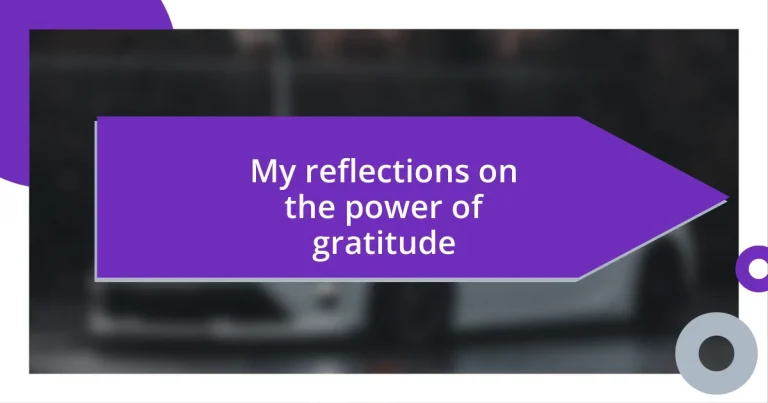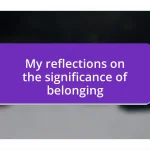Key takeaways:
- Practicing gratitude enhances mental health, boosts resilience, and strengthens relationships, leading to improved overall well-being.
- Engaging in gratitude practices, such as journaling, thank-you notes, and group sharing, fosters personal growth and deeper connections.
- Overcoming challenges to gratitude, like stress and vulnerability, can transform one’s perspective and encourage empathy towards others.
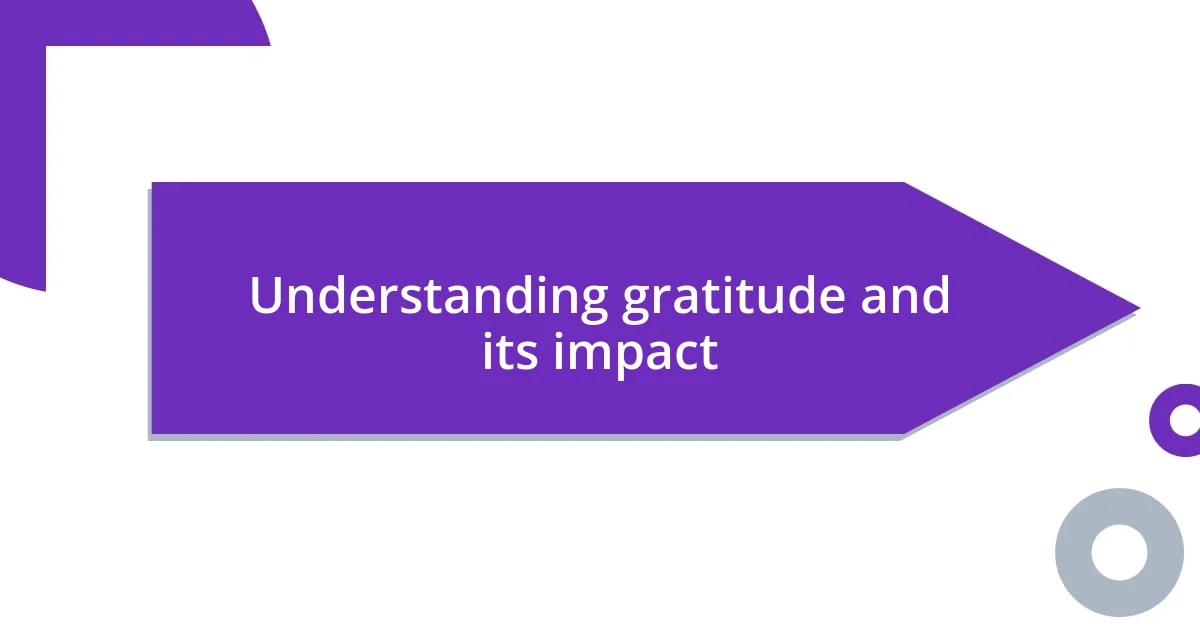
Understanding gratitude and its impact
Gratitude is more than just a polite response; it’s a powerful emotion that can shift our perspective on life. I remember a particularly challenging period when I started a gratitude journal, writing down three things I appreciated each day. It surprised me how these small reflections began to transform my mindset, revealing joys that felt overshadowed by stress.
The impact of gratitude can be profound. When I took a moment to express thanks to a friend who had supported me during tough times, I noticed how it not only deepened our bond but also lifted my spirits. Isn’t it fascinating how acknowledging someone else’s kindness can create a ripple effect, enhancing our own mood?
Studies show that practicing gratitude can improve mental health, increase resilience, and foster relationships. I often wonder why I sometimes forget to pause and recognize these moments. By intentionally focusing on gratitude, we not only enrich our own lives but also contribute positively to the world around us.
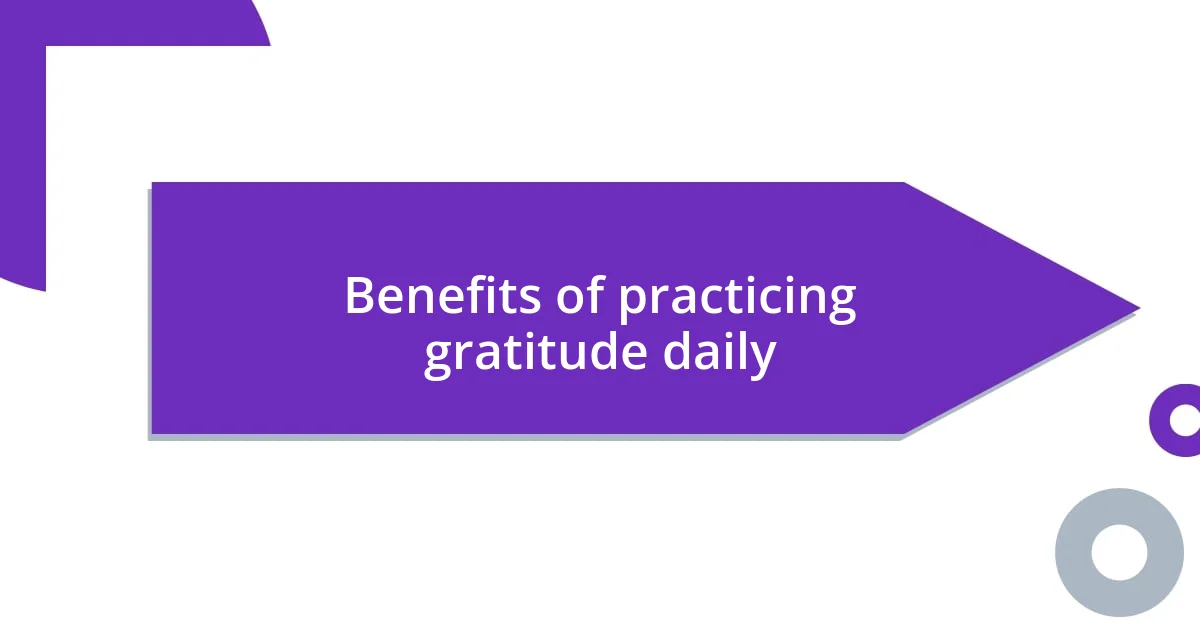
Benefits of practicing gratitude daily
Practicing gratitude daily can lead to significant improvements in our overall well-being. I remember when I started incorporating gratitude into my morning routine. Just by taking a few minutes to acknowledge the good in my life before diving into the day, I noticed that my stress levels decreased remarkably. It became easier to tackle challenges, almost as if a layer of heaviness was lifted off my shoulders.
The benefits are not just emotional; they manifest beautifully in various aspects of life:
- Enhanced Mood: Regular gratitude practices can elevate mood and reduce feelings of anxiety and depression.
- Better Sleep: Expressing gratitude has been linked to improved sleep quality, as it helps clear the mind of negativity before bedtime.
- Increased Resilience: A gratitude-focused mindset can help us bounce back from setbacks more effectively, reinforcing a hopeful perspective.
- Healthier Relationships: Acknowledging and appreciating others strengthens our connections and fosters a supportive community.
- Heightened Empathy: Practicing gratitude encourages us to see things from others’ perspectives, boosting our empathy and understanding.
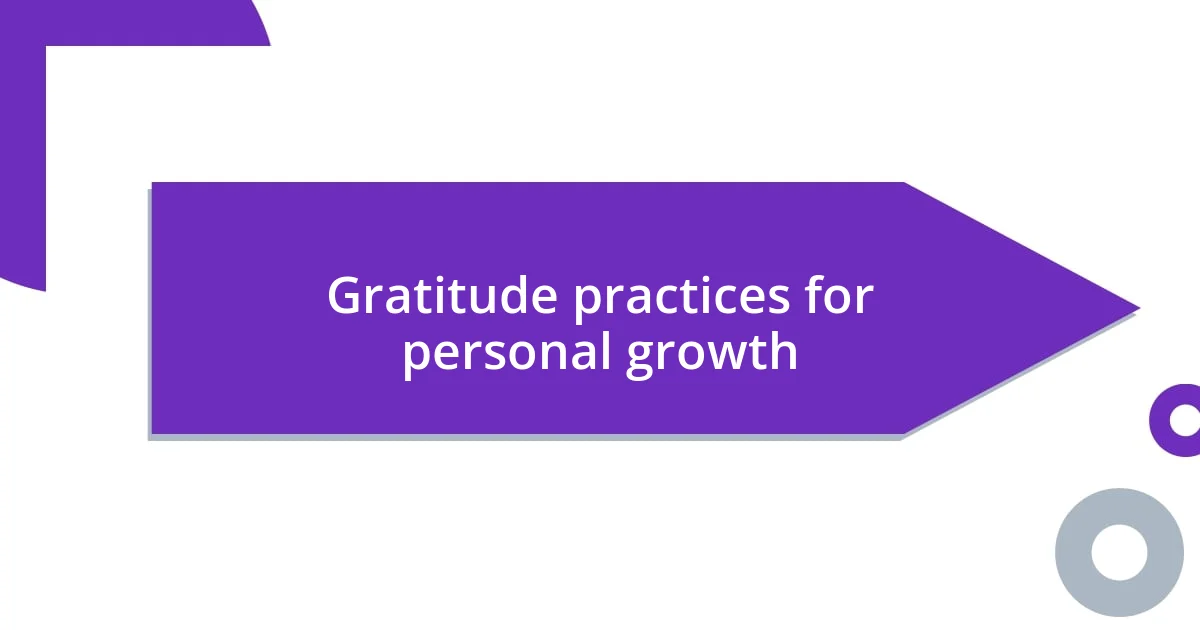
Gratitude practices for personal growth
Gratitude practices for personal growth can be transformative when embraced intentionally. I often reflect on my experience with a simple practice: writing a thank-you note to someone each week. This small act has not only deepened my relationships but has also instilled in me a reflective mindset, encouraging me to appreciate the efforts others make. It feels good to take a moment for this focus; it’s like planting seeds that bloom into stronger connections.
Another practice I’ve explored is the “gratitude jar.” Each week, I write down a few things I’m thankful for and store them in a jar. On days when I feel discouraged, I revisit these notes, reminding myself of the positivity in my life. This act creates a tangible collection of joy, bringing a sense of fulfillment that helps me shift my perspective in tough times. Doesn’t it feel rewarding to see how much goodness exists, even when it’s hard to acknowledge?
Moreover, I’ve found that sharing gratitude in a group setting can amplify the experience. For instance, during a team meeting, we’ll often take a few minutes to share what we appreciate about one another. The practice fosters not only an uplifting environment but also strengthens our collaborative spirit. I can’t help but smile when I think about these moments; they create a sense of belonging that’s truly invaluable.
| Gratitude Practice | Personal Growth Impact |
|---|---|
| Thank-You Notes | Strengthens relationships and reflective mindset |
| Gratitude Jar | Tangible reminders of joy and perspective shifts |
| Group Gratitude Sharing | Enhances team spirit and sense of belonging |
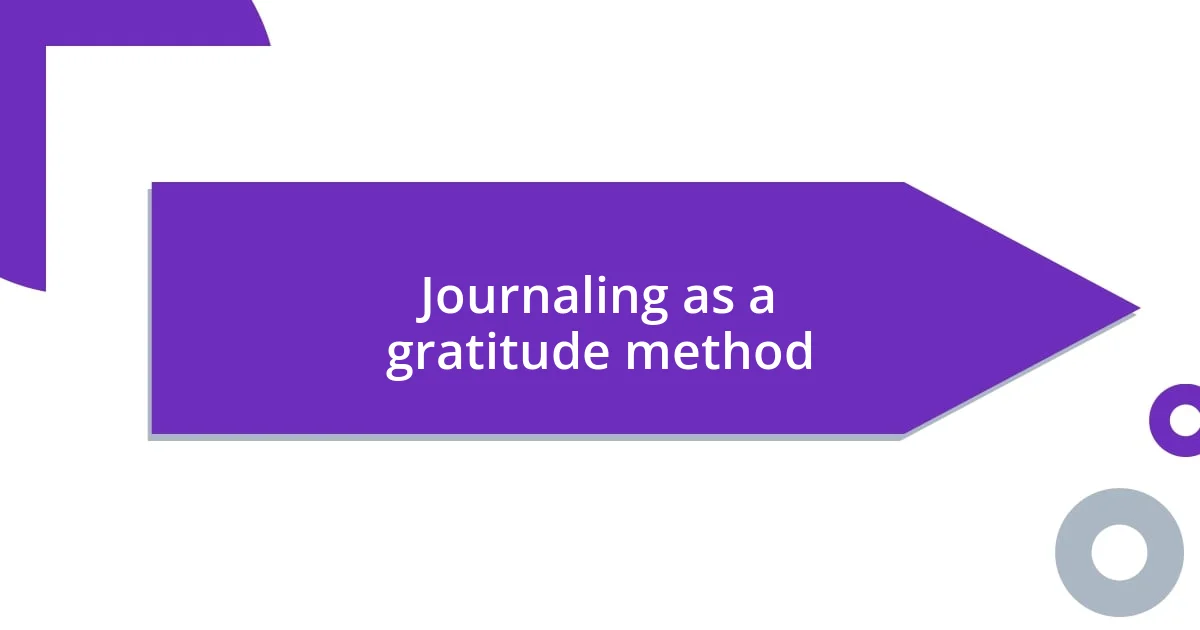
Journaling as a gratitude method
Journaling as a gratitude method has been one of my most rewarding practices. I still remember the first time I sat down with my journal, pen in hand, unsure of what to write. But as I began listing even just three things I appreciated from the day—like a warm cup of coffee or a kind word from a friend—I felt an unexpected warmth spreading through me. It was fascinating to realize that something so simple could shift my focus and brighten my outlook.
I’ve discovered that making this a nightly ritual has profound effects on my sleep. Sometimes, I scroll back through previous entries before bed and find notes that remind me of joyful moments I almost forgot. It’s like I’m tucking little pieces of happiness away to pull out on the tough days. Have you ever experienced that feeling of surprise when you recall something enjoyable? I’ve found that revisiting my gratitude moments feels like wrapping myself in a cozy blanket at the end of a long day.
What I truly love about journaling for gratitude is that it’s personal and flexible. There are no strict rules; I can doodle, write poems, or simply list points that resonate with me. There’s something cathartic about that freedom. When was the last time you let your thoughts flow uninhibited? Each reflection becomes a snapshot of appreciation, helping me cultivate a mindset that is not only grateful but also resilient in the face of challenges.
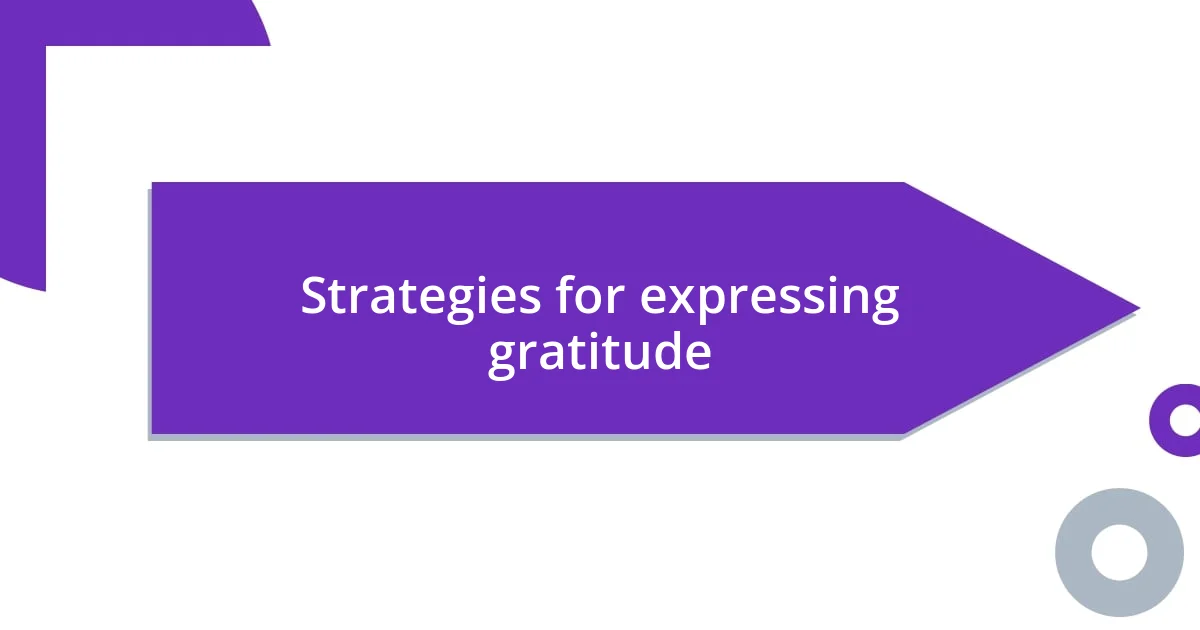
Strategies for expressing gratitude
One of the simplest yet most effective ways to express gratitude is to verbally acknowledge the people around you. I remember a particularly tough day when a colleague took the time to help me meet a deadline. Instead of just saying “thanks,” I let him know how much his support meant to me. That moment of genuine connection made us both feel valued. Have you ever noticed how a heartfelt compliment can light up someone’s face?
Another powerful strategy I’ve embraced is creating “gratitude moments” throughout my day. For instance, during my morning coffee, I take a pause to reflect on at least one person I’m thankful for in my life. I visualize that person and the impact they’ve made. It’s a reflective practice that anchors my day positively. I can’t help but wonder—how might your day shift if you dedicated a few minutes to this practice?
In addition, I’ve discovered the beauty of incorporating art into my gratitude expressions. When I’m feeling particularly inspired, I grab some paint or colored pencils and create something that represents my appreciation for someone special. Each stroke feels like a tangible celebration of their presence and influence in my life. Have you ever tried expressing gratitude creatively? It’s an experience that resonates deeply, transforming appreciation into a visual form of joy that I can revisit and share.
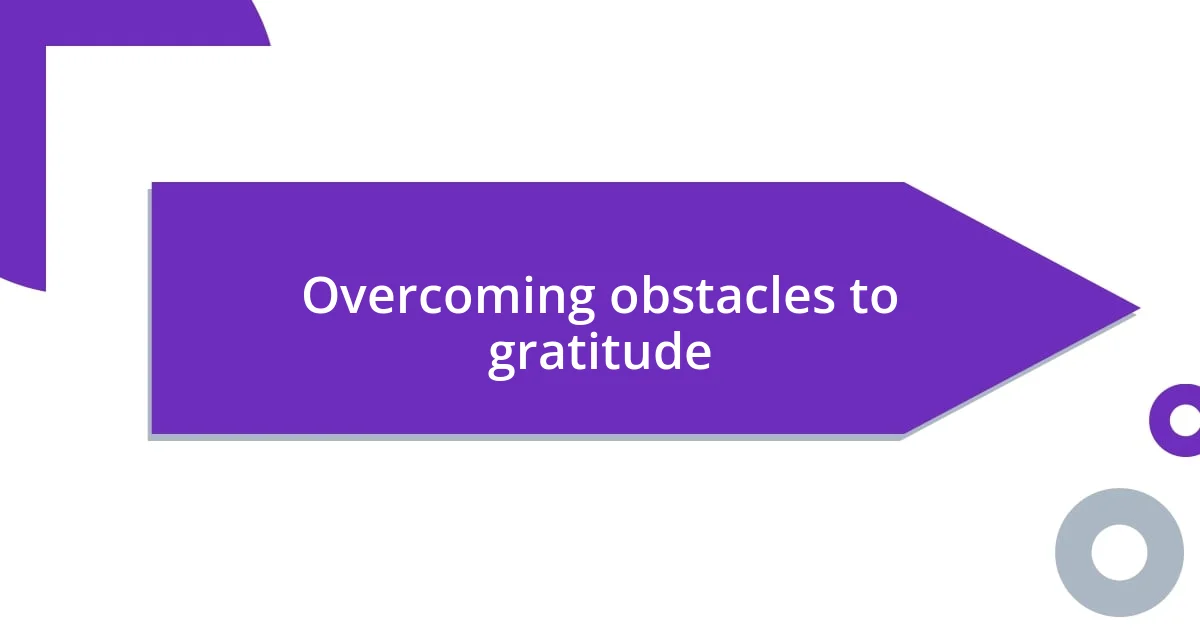
Overcoming obstacles to gratitude
Gratitude can sometimes feel overshadowed by life’s challenges. I often find myself caught in the whirlwind of stress, making it difficult to acknowledge my blessings. Have you ever had one of those days where everything seems to drown out the good? During such times, I pause and remind myself that even the smallest positives, like a friendly smile from a stranger, can shine through the chaos.
Admittedly, it’s easy to slip into a mindset of scarcity, where I’m only focusing on what’s missing or what’s going wrong. I had a moment recently when I was overwhelmed by responsibilities. Instead of spiraling, I took a deep breath and listed the support I had—friends, family, and even my dog wagging his tail every time I walked in. It’s a simple shift, but focusing on these supportive elements turned my worries into an appreciation of what enriches my life. How might your perspective change if you actively searched for these anchors during tough times?
Another obstacle I’ve encountered is the fear of vulnerability. Expressing gratitude often requires me to open up, which can feel daunting. I remember hesitating to share my gratitude with my sister after moving away; it felt raw and exposed. However, taking that leap and sending her a heartfelt note not only strengthened our bond but also brought my feelings to the surface. Have you ever been surprised by the relief that comes from simply acknowledging your emotions? Overcoming that reluctance can pave the way for deeper connections, reminding us that gratitude is not just a solitary reflection, but a shared experience that nourishes relationships.
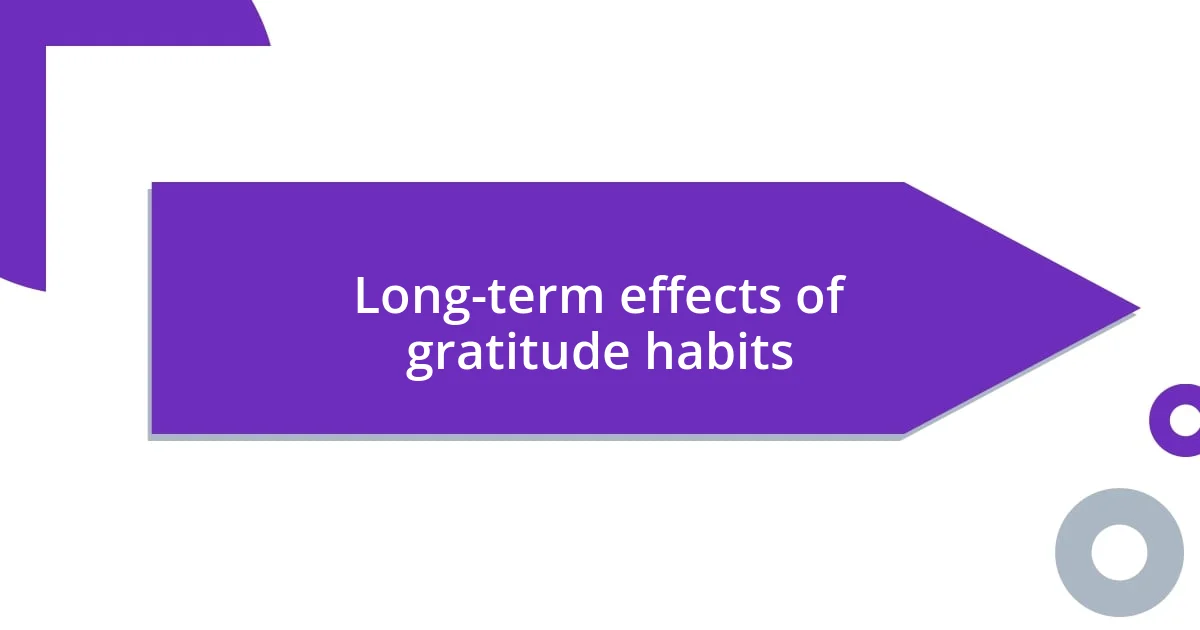
Long-term effects of gratitude habits
Regularly practicing gratitude has profound long-term effects on mental well-being. I’ve noticed that over time, my overall outlook on life has become more positive and resilient. For instance, after I started maintaining a gratitude journal, I realized how easily I could shift my focus from negativity to appreciation—even during challenging times. Doesn’t it feel liberating to actively look for the good, especially when life gets tough?
Another aspect to consider is how gratitude can enhance relationships. During a particularly meaningful dinner with friends, I took a moment to share my appreciation for their unwavering support. The warmth that filled the room was unlike anything I had experienced before. It made me wonder—what if more moments were spent expressing these feelings? Such practices not only deepen connections but also create a ripple effect, encouraging others to embrace gratitude too.
Lastly, the benefits of gratitude extend beyond my personal circles; they affect how I interact with the world. I’ve found that being thankful has increased my empathy towards others. Instead of reacting with frustration in stressful situations, I now pause to consider what burdens someone else might be carrying. This shift in perspective feels empowering—it’s like wearing a lens of compassion filtered through appreciation. Have you ever thought about how gratitude impacts your interactions with strangers? It’s a fascinating reminder that every act of kindness can stem from an attitude of gratitude.












